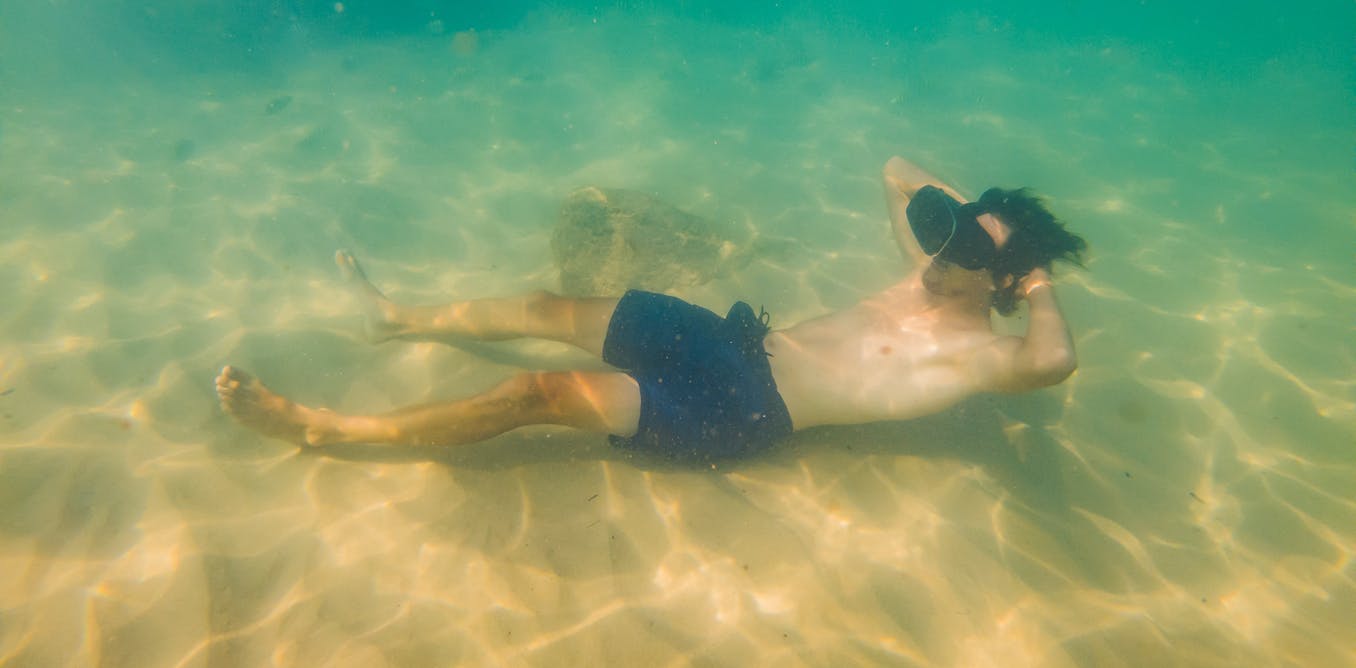Virtual reality may help us develop empathy for oceans and marine life

Virtual reality may be a useful tool to increase public awareness and empathy for ocean environments. (Shutterstock)
Hundreds of kilometres from shore, and covering two-thirds of the Earth’s surface, the high seas are a world that few of us will ever see. After more than a year in the field, Pulitzer Prize-winning journalist Ian Urbina concluded: “There are few remaining frontiers on our planet. Perhaps the wildest, and the least understood, are the world’s oceans.”
Governed by no single country or authority, the high seas represent a literal and figurative final frontier. And in this age of information — where we can access livestreams from Mars, for example — we know shockingly little about the ocean.
The race for oceanic resources
Despite being inaccessible to many, the world’s oceans are under an extraordinary set of pressures. Climate change and industrial overfishing remain the most critical threats — they undermine the oceans’ capacity to provide nutritious food and fulfilling livelihoods for hundreds of millions of people.
At the same time, new players are turning towards the oceans as a source of economic growth. The ocean economy is projected to double from US$1.5 trillion in 2010 to US$3 trillion by 2030.
The global rush to develop the “blue economy” risks harming the marine environment and, in turn, affecting human well-being and exacerbating inequalities. For example, a recent study found that 10 wealthy countries own 98 per cent of patents involving marine organisms. Similarly, a small group of rich nations, who subsidize their fishing fleets, dominate global fishing efforts. And just 10 powerful corporations generate almost half — 45 per cent — of the wealth from the ocean economy.
Scientists have coined this race for ocean food, material and space as the “blue acceleration.”

Farming sea bass and sea bream in growing cages in Galaxidi, Greece.
(Shutterstock)
Ocean empathy
These converging threats have led scientists to argue that fostering empathy is required to repair the relationships between people and nature. In a recent interview with National Geographic, climate activist Greta Thunberg observed that “we live in a post-truth society … we don’t care … we have lost empathy.”
As Thunberg suggests, our collective loss of empathy for the planet and for each other is one of our greatest challenges.

This story is part of Oceans 21
Our series on the global ocean opened with five in-depth profiles. Look out for new articles on the state of our oceans in the lead up to the UN’s next climate conference, COP26. The series is brought to you by The Conversation’s international network.
Getting people to care about the oceans — which are out of sight and out of mind for many — can be particularly challenging. A recent survey of 3,500 global leaders found that they consider UN Sustainable Development Goal 14, Life Below Water, to be the least important goal.
The world’s oceans are in urgent need of protection. But ocean stewardship is impossible without empathy for marine ecosystems and the communities who depend on them. In this context, an important research question becomes how can researchers foster empathy for nature?
Fostering empathy through virtual reality
Fortunately, an emerging body of research suggests that empathy can be nurtured. In particular, research suggests that virtual reality can be a powerful medium to trigger empathy.
This field of research is based on the premise that the immersive nature of virtual reality sets it apart from other media when it comes to stimulating empathy. Research is demonstrating the potential of virtual reality to stimulate users’ capacity to imagine and pursue more sustainable futures and to encourage pro-environmental behaviour.
Building on this work, we asked whether experiencing the oceans in a virtual reality environment could make someone care about them and take action?
We found that the experience did foster empathy. We also found that research participants cared more after experiencing the pessimistic scenario in comparison to the optimistic scenario. As one of the first studies to demonstrate the influence of virtual reality to build ocean empathy, this research makes important contributions to advancing research on novel methods for supporting ocean sustainability.
Digital technologies can help foster empathy in people who experience oceans virtually.
While virtual reality is far from being an everyday technology for the masses, research is informing how scientists can use it to communicate.
The oceans are at once vast and fragile, remote and central. Ocean literacy and #oceanoptimism are needed now more than ever. As marine ecologist Jane Lubchenco has argued, the oceans connect, feed and heal us — and are too important to leave behind.

Jessica Blythe receives funding from the Social Science and Humanities Research Council (SSHRC).
Colette Wabnitz has previously received funding from the Nippon Foundation-the University of British Columbia Nereus Program, and receives funding from the Walton Family Foundation, the David and Lucile Packard Foundation, the Gordon and Betty Moore Foundation and the Ocean Risk and Resilience Action Alliance.
Gary Pickering receives funding from the Social Science and Humanities Research Council (SSHRC).
Julia Baird receives funding from the Canada Research Chairs program.
Nathan Bennett receives research funding from the Social Sciences and Humanities Research Council of Canada (SSHRC) for various projects.
Kirsty L Nash does not work for, consult, own shares in or receive funding from any company or organisation that would benefit from this article, and has disclosed no relevant affiliations beyond their academic appointment.







